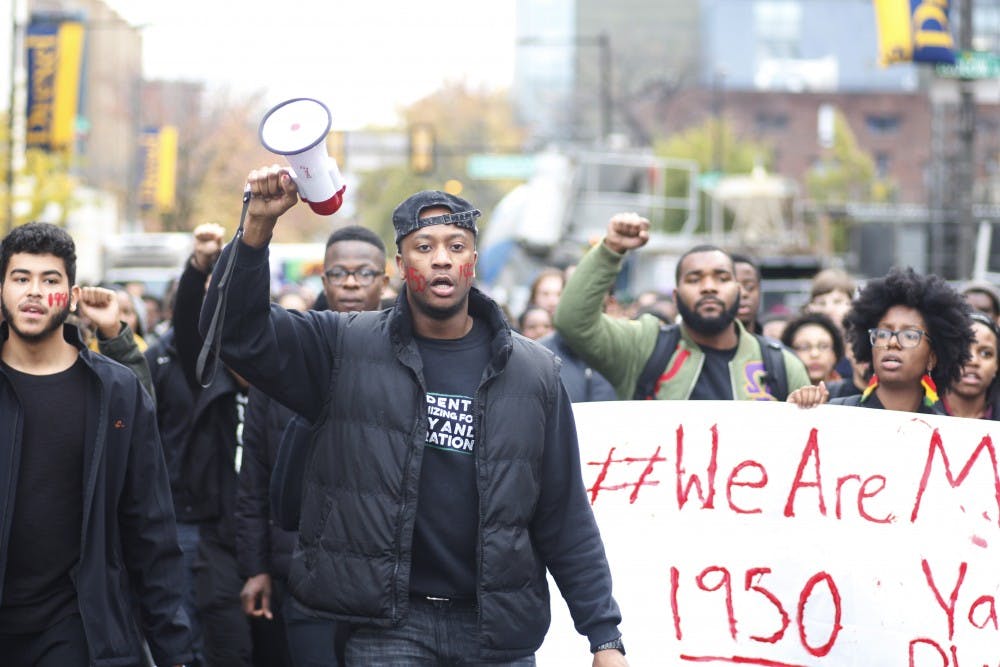
In the wake of last month's student protests at Yale and University of Missouri, Penn students are criticizing the administration for not doing enough to address structural racism at Penn.
Credit: Drew McKinzieLast month, students at University of Missouri, Yale and a number of other colleges and universities across the country protested against structural racism at their institutions.
Penn President Amy Gutmann, along with several other high-level administrators, sent out a University notification via email to faculty, students and staff on Nov. 13 in response to the events.
“We cannot state strongly enough that at Penn, everyone belongs,” the email read.
It went on to reference an initiative launched in April at Penn called the Campaign for Community. According to the email, “[The Campaign] is designed to bring people from across campus together to collectively address questions such as: How do we interact with one another? How do we value our differences? How can we best talk about those differences?”
Lyndsey Beutin, a white doctoral candidate who researches race and representation as well as violence, memory and the media at the Annenberg School for Communication, said the administration’s response wasn’t good enough.
“[The Campaign] is using ... universalizing language to not actually address the very specific demands and the very specific institutional pain that Penn is causing students of color,” she said.
The Campaign was formed following the events surrounding Michael Brown’s death in Ferguson last school year, in response to which students also mobilized on campuses around the country, including at Penn. Beutin said that Students Organizing for Unity and Liberation had very specific demands at the time, calling for the hiring of more professors and CAPS counselors of color, for example. But instead of directly responding to the students’ demands, the University initiated the Campaign for Community.
Beutin wrote a letter to Penn’s administration in response to last month’s University notification. In it, she referenced initiatives like The Working Group on Slavery, Memory and Reconciliation at Georgetown and the Committee on Slavery and Injustice at Brown, which serve as more specific alternatives to the Campaign.
She also said that the University notification itself was lacking.
“Other institutions like Oberlin have written much more thorough letters,” she said. “[They] are much more explicitly saying ‘We stand with the students at Mizzou; we hear these concerns.’ Penn’s letter didn’t even do that. It was almost surprising that it even mentioned race specifically.”
The Vice Provost for University Life, Valarie Swain-Cade McCoullum, is one of the Campaign’s three co-chairs. She said the formation of the Campaign “wasn’t just about racism.”
She went on to cite sexual assault and mental health as other examples of the topics of the “difficult conversations” that the Campaign for Community provides a space for. Cade also said that there are other resources on campus that cover topics of race.
“If you look through even the offerings of the schools and of the VPUL and other resources and other campus entities, there are lots of tough and quite specific and direct conversations about race,” she said.
Law professor Claire Finkelstein, another of the Campaign’s co-chairs, said the Campaign’s name is purposefully designed to adapt to the types of difficult conversations that students at Penn need to have in the future.
“The framework is a good one because it allows us to be flexible and responsive to the needs of the members of our community,” she said.
But Beutin isn’t so sure that just providing a space for conversation is always the answer.
“Especially in the academy, the recourse to conversation is one that we’re really comfortable with, and it’s also the one that’s really easy to police,” she said. “It’s important to think through what does conversation disallow? What does conversation do to political resistance?”
The Daily Pennsylvanian is an independent, student-run newspaper. Please consider making a donation to support the coverage that shapes the University. Your generosity ensures a future of strong journalism at Penn.
DonatePlease note All comments are eligible for publication in The Daily Pennsylvanian.





